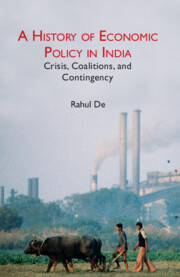Book contents
- Frontmatter
- Contents
- List of Figures and Tables
- Preface
- Acknowledgments
- List of Abbreviations
- Introduction
- 1 Colonialism and the Indian Economy
- 2 The Drive to Industrialize under Nehru's Leadership: 1950–66
- 3 The Turn to Populism under Indira Gandhi: 1967–79
- 4 The Early Liberalization Years: 1980–2003
- 5 Maturity of Reforms in the UPA Years: 2004–13
- 6 Reforms under the NDA Government: 2014–19
- Index
2 - The Drive to Industrialize under Nehru's Leadership: 1950–66
Published online by Cambridge University Press: 14 September 2023
- Frontmatter
- Contents
- List of Figures and Tables
- Preface
- Acknowledgments
- List of Abbreviations
- Introduction
- 1 Colonialism and the Indian Economy
- 2 The Drive to Industrialize under Nehru's Leadership: 1950–66
- 3 The Turn to Populism under Indira Gandhi: 1967–79
- 4 The Early Liberalization Years: 1980–2003
- 5 Maturity of Reforms in the UPA Years: 2004–13
- 6 Reforms under the NDA Government: 2014–19
- Index
Summary
At the stroke of the midnight hour on August 15, 1947, the world slept while India awoke to life and freedom. The Indian economy, however, would not be free of its structural deficiencies and uneven developments from colonial rule – even after achieving political sovereignty. The primary task facing Nehru and his advisors on the eve of independence was clear: India needed to grow at a fast pace and achieve industrial development to catch up with the rest of the world while breaking away from its economic dependency on Britain and other superpowers. The tricky task facing the government was how they intended to achieve these goals while facing constraints of capital resources and accommodating the diversity of economic interest groups that existed in the country. In this chapter, I will explain the economic development goals of the Indian economy after independence and the choice of policies to achieve them. This explanation will include studying the historical context of these policies, the internal and global contestations around these policies, and the role of contingent events in shaping them. While the institutions of colonialism and its critique paved the direction of the development trajectory, historical contingency and the impossibility of balancing contradictory and antagonistic interest groups and global politics eventually shaped the application and impact of these policies. It is important to be mindful of these circumstances to appreciate how Nehruvian policies have both shaped the institutions and trajectory of India's future economic growth but also passed on the deficiencies and imbalances that existed within the economy. It is not the mandate of this book to evaluate whether the policies were right or wrong; instead, I hope to show the multiple and contradictory forces that shaped the policy choice and simulate the reasoning behind these choices.
Inheriting the Colonial Economy
The new government had adopted an economy shaped by almost two centuries of colonial rule. The agricultural sector was highly unequal in terms of land ownership and access to capital. The majority of the population was dependent on the vagaries of the monsoon and markets and caught in webs of debt. The added pressure of an increasing population with limited land meant that the majority of peasants were poverty-stricken, with no opportunity to increase the productivity of the land. The landlord class thriving within ancient feudal hierarchies had little incentive to improve production.
- Type
- Chapter
- Information
- A History of Economic Policy in IndiaCrisis, Coalitions, and Contingency, pp. 40 - 68Publisher: Cambridge University PressPrint publication year: 2024



